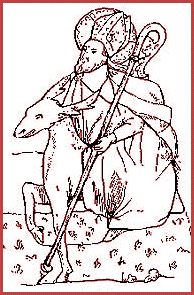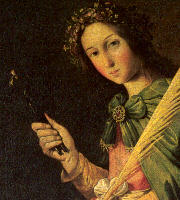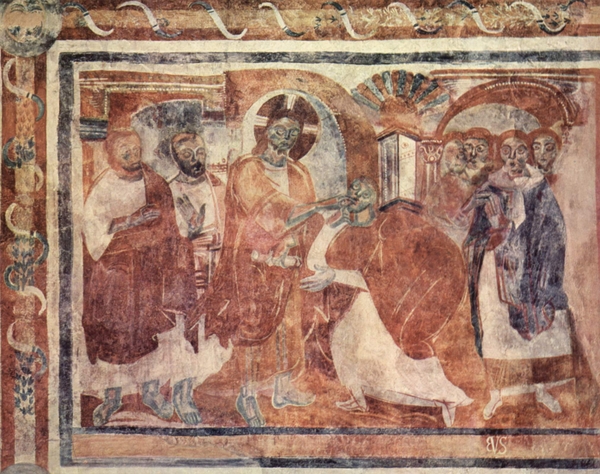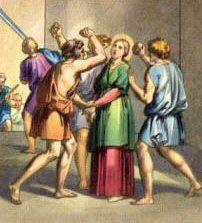31. And again, departing from the coasts of Tyre and Sidon, he came unto the sea of Galilee, through the midst of the coasts of Decapolis.
32. And they bring unto him one that was deaf, and had an impediment in his speech; and they beseech him to put his hand upon him.
33. And he took him aside from the multitude, and put his fingers into his ears, and he spit, and touched his tongue;
34. And looking up to heaven, he sighed, and said to him, Ephphatha, that is, Be opened.
35. And straightway his ears were opened, and the string of his tongue was loosed, and he spoke plain.
36. And he charged them that they should tell no man: but the more he charged them, so much the more a great deal they published it;
37. And were beyond measure astonished, saying, He has done all things well: he makes both the deaf to hear, and the dumb to speak.
THEOPHYL. The Lord did, not wish to stay in the parts of the Gentiles, lest He should give the Jews occasion to say, that they esteemed Him a transgressor of the law, because He held communion with the Gentiles, and therefore He immediately returns; wherefore it is said, And again departing from the coasts of Tyre, he came through Sidon, to the sea of Galilee, through the midst of the borders of Decapolis.
BEDE; Decapolis is a region of ten cities, across the Jordan, to the east, over against Galilee . When therefore it is said that the Lord came to the sea of Galilee, through the midst of the borders of Decapolis, it does not mean that He entered the confines of Decapolis themselves; for He is not said to have crossed the sea, but rather to have come to the borders of the sea, and to have reached quite up to the place, which was opposite to the midst of the coasts of Decapolis, which were situated at a distance across the sea.
It goes on, And they bring him one that was deaf and dumb, and they besought him to lay hands upon him.
THEOPHYL. Which is rightly placed after the deliverance of one possessed with a devil, for such an instance of suffering came from the devil. There follows, And he took him aside from the multitude, and put his fingers into his ears.
PSEUD-CHRYS. He takes the deaf and dumb man who was brought to Him apart from the crowd, that He might not do His divine miracles openly; teaching us to cast away vain glory and swelling of heart, for no one can work miracles as he can, who loves humility and is lowly in his conduct. But He puts His fingers into his ears, when He might have cured him with a word, to show that His body, being united to Deity, was consecrated by Divine virtue, with all that He did. For since on account of the transgression of Adam, human nature had incurred much suffering and hurt in its members and senses, Christ coming into the world showed the perfection of human nature in Himself, and on this account opened ears with His fingers, and gave the power of speech by His spittle. Wherefore it goes on, And spit, and touched his tongue.
THEOPHYL. That He might show that all the members of His sacred body are divine and holy, even the spittle which loosed the string of the tongue. For the spittle is only the superfluous moisture of the body, but in the Lord all things are divine. It goes on, And looking up to haven, he groaned, and said to him, Ephphatha, that is, Be opened.
BEDE; He looked up to heaven, that He might teach us that thence is to be procured speech for the dumb, hearing for the deaf, health for all who are sick. And He sighed, not that it was necessary for Him to beg any thing from His Father with groaning, for He, together with the Father, gives all things to them who ask, but that He might give us an example of sighing, when for our own errors and those of our neighbors, we invoke the guardianship of the Divine mercy.
PSEUD-CHRYS. He at the same time also groaned, as taking our cause upon Himself, and pitying human nature, seeing the misery into which it had fallen.
BEDE; But that which He says, Ephphatha, that is, Be opened, belongs properly to the ears, for the ears are to be opened for hearing, but the tongue to be loosed from the bonds of its impediment, that it may be able to speak.
Wherefore it goes on, And straightway his ears were opened, and the string of his tongue was loosed, and he spoke plain. Where each nature of one and the same Christ is manifestly distinct, looking up indeed, into Heaven as man, praying unto God, He groaned, but presently with one word, as being strong in the Divine Majesty, He healed.
It goes on, And be charged them that they should tell to man.
PSEUD-CHRYS. By which He has taught us not to boast in our powers, but in the cross and humiliation. He also bade them conceal the miracle, lest He should excite the Jews by envy to kill Him before the time.
PSEUDO-JEROME; A city, however, placed on a hill cannot be hid, and lowliness always comes before glory . Wherefore it goes on, But the more he charged them, so much the more a great deal they published it.
THEOPHYL. By this we are taught , when we confer benefits on any, by no means to seek for applause and praise; but when we have received benefits, to proclaim and praise our benefactors, even though they be unwilling.
AUG. If however He, as one Who knew the present and the future wills of men, knew that they would proclaim Him the more in proportion as He forbade them, why did He give them this command? If it were not that He wished to prove to men who are idle, how much more joyfully, with how such greater obedience, they whom He commands to proclaim Him should preach, when they who were forbidden could not hold their peace.
GLOSS. From the preaching however of those who were healed by Christ, the wonder of the multitude, and their praise of the benefits of Christ, increased. Wherefore it goes on, And they were beyond measure astonished, saying, He has done all things well; he makes the deaf to hear, and the dumb to speak.
PSEUDO-JEROME; Mystically, Tyre is interpreted narrowness, and signifies Judea, to which the Lord said, "For the bed is grown too narrow," and from which he turns himself to the Gentiles. Sidon means' hunting,' for our race is like an untamed beast, and 'sea,' which means a wavering inconstancy. Again, the Savior comes to save the Gentiles in the midst of the coasts of Decapolis, which may be interpreted, as the commands of the Decalogue. Further, the human race throughout its many members is reckoned as one man, eaten up by varying pestilence, in the first created man; it is blinded, that is, its eye is evil; it becomes deaf, when it listens to, and dumb when it speaks, evil. And they prayed Him to lay His hand upon him, because many just men, and patriarchs, wished and longed for the time when the Lord should come in the flesh.
BEDE; Or he is deaf and dumb who neither has ears to hear the words of God, nor opens his mouth to speak them, and such must be presented to the Lord for healing, by men who have already learned to hear and speak the divine oracles.
PSEUDO-JEROME; Further, he who obtain healing is always drawn aside from turbulent thoughts, disorderly actions, and incoherent speeches. And the fingers which are put into the ears are the words and the gifts of the Holy Ghost, whom it is said, This is the finger of God. The spittle is heavenly wisdom, which loosens the sealed lips of the human race, so that it can say, I believe in God, the Father Almighty and the rest of the Creed. And looking up to heaven, he groaned, that is, He taught us to groan, and to raise up the treasures of our hearts to the heavens; because by the groaning of hearty compunction, the silly joy of the flesh is purged away. But the ears are opened to hymns, and songs, and psalms; and He looses the tongue, that it may pour forth the good word, which neither threats nor stripes can restrain.
Catena Aurea Mark 7
Catholic Culture
Ordinary Time: February 9th
Friday of the Fifth Week of Ordinary Time; St. Teilo (Wales)
MASS READINGS
February 09, 2018 (Readings on USCCB website)
COLLECT PRAYER
Keep your family safe, O Lord, with unfailing care, that, relying solely on the hope of heavenly grace, they may be defended always by your protection. Through our Lord Jesus Christ, your Son, who lives and reigns with you in the unity of the Holy Spirit, one God, for ever and ever.
show
Recipes (2)
show
Activities (1)
show
Prayers (1)
show
Library (1)
Old Calendar: St. Cyril of Alexandria, bishop and doctor; St. Apollonia, virgin and martyr
Today the feast of St. Teilo, bishop, is celebrated in Wales.
According to the 1962 Missal of St. John XXIII the Extraordinary Form of the Roman Rite, today is the feast of St. Cyril of Alexandria, bishop and doctor, and St. Apollonia, virgin and martyr. St. Cyril's feast in the Ordinary Form of the Roman Rite is celebrated on June 27th. St. Apollonia was a young martyr of Alexandria. She was arrested and executed in about 250 during a riot provoked against the Christians. Her executioners broke all her teeth. She is invoked for the cure of a toothache.
St. Teilo
 According to tradition Teilo, or Elios as he was sometimes known, was born about the year 480 AD at either Gumfreston or Penally in south Pembrokeshire. He studied under Paulinus at Ty Gwyn where he met Dewi (Saint David), the two becoming firm friends. Later, the two set out on a pilgrimage to Jerusalem and en route were joined by Padarn.
According to tradition Teilo, or Elios as he was sometimes known, was born about the year 480 AD at either Gumfreston or Penally in south Pembrokeshire. He studied under Paulinus at Ty Gwyn where he met Dewi (Saint David), the two becoming firm friends. Later, the two set out on a pilgrimage to Jerusalem and en route were joined by Padarn.
Upon their return home, Teilo was given charge of the church at Llandaff and the surrounding area. Shortly afterwards there was an outbreak of Yellow Fever and Teilo led his followers to Cornwall to escape its effects. From Cornwall they travelled to Brittany where they were welcomed by Archbishop Solomon of the Church of Dol. They stayed for seven years, during which time Teilo and his followers are said to have planted three miles of fruit trees. He returned to Llandaff where he ministered for many years. He died in 566 AD.
Several churches in south Wales and Brittany are dedicated to St Teilo. He is depicted on a fifteenth century stained glass window in a church at Plogonnec, Finistére, and also in a statue in the Chapel of Our Lady, Kerdévot. In both cases he is shown wearing bishop's robes and mitre and seated on a stag, suggesting, as was the case with many other saints of the time, that he had an affinity with the natural world.
— National Museum Wales
Patron: Horses and fruit trees.
Things to Do:
- Visit this interesting site which gives you information about the picturesque and ancient town of Llandeilo, Wales as well as St. Teilo.
- Read more about St. Teilo here.
St. Apollonia
 The Martyrology reads: "At Alexandria the holy virgin Apollonia—under the Emperor Decius (249-251) her teeth were beaten out; then the executioners built and lit a funeral pyre, and threatened to burn her alive unless she would repeat their blasphemies. After some reflection she suddenly tore herself loose from her tormentors and threw herself into the flames. The fire of the Holy Spirit that glowed within her was more intense than the burning pyre. Her executioners were astounded to see a weak woman willingly embracing death with such determination before they were ready to carry out their threats."
The Martyrology reads: "At Alexandria the holy virgin Apollonia—under the Emperor Decius (249-251) her teeth were beaten out; then the executioners built and lit a funeral pyre, and threatened to burn her alive unless she would repeat their blasphemies. After some reflection she suddenly tore herself loose from her tormentors and threw herself into the flames. The fire of the Holy Spirit that glowed within her was more intense than the burning pyre. Her executioners were astounded to see a weak woman willingly embracing death with such determination before they were ready to carry out their threats."
The saint was already well on in years. An account of St. Apollonia's martyrdom was written by Bishop Dionysius of Alexandria (died 265), a contemporary. She is honored as the patroness against toothache.
Apollonia, it might seem, committed suicide. Her act was used by the ancients as proof that it is permitted to escape dishonor or persecution through voluntary death. But the most authoritative moralists, including Saint Augustine, declare that even in such cases suicide is not permitted, and seek to justify Apollonia's heroic act by assuming that she acted according to a special mandate from God; without such a divine injunction no one is allowed to follow her example. The saints are not to be imitated on every point.
— Excerpted from The Church's Year of Grace, Pius Parsch
Patron: Dentists, tooth disease, toothache.
Symbols: Deaconess holding a set of pincers which often holds a tooth; gilded tooth; pincers grabbing a tooth; pincers; tooth and a palm branch; tooth; woman wearing a golden tooth on a chain.
Things to Do:
- Pray to St. Apollonia for a courageous and holy death. The elderly especially may beseech her to strengthen their faith as they weaken and approach death.
The Word Among Us
Meditation: Mark 7:31-37
View NAB Reading at USCCB.org | Subscriber? Login to view archives
Article Tools
5th Week in Ordinary Time
He put his finger into the man’s ears and, spitting, touched his tongue. (Mark 7:33)
Life has become much more automated recently, hasn’t it? Driverless cars are on the horizon. Cell phones can now be unlocked through facial recognition software. If you go to the grocery store or the public library, you’ll find people flocking to the self-checkout stand. Certainly these innovations have made life more convenient. But there’s still something to be said for the old-fashioned kind of customer service, in which a cashier hands you your money, and you sometimes end up chatting about the weather, sports, or a recent family outing. It’s what we sometimes call the “human touch.”
Human contact is not only important to us, but it’s important to God as well. That’s why Jesus held children in his lap, and it’s why he had no hesitation touching lepers. It’s also why, in today’s reading, he didn’t just pray words of healing. He made it a point to touch the deaf and mute man.
Jesus may no longer be present on earth physically, but he still wants to touch people. He wants to do it through us. This is especially important in our time, as we live in a world where human interaction seems to be decreasing every day.
Something that seems as insignificant as a warm handshake or a pat on the shoulder can be a huge comfort at times. A warm embrace can bring healing to a close friend who is struggling. Even a simple “hello” coupled with a smile can lift someone’s spirits. And if you have the opportunity to pray with someone, you might ask if it’s okay to hold their hand or place your hand on their shoulder while you pray.
God has given all of us a healthy desire to give and receive love. When that desire is bottled up, we suffer, and the people we have an opportunity to help suffer as well.
So let’s make it a point to go out of our way to touch people with a smile and a warm gesture of affection today. In our homes, let’s make it a point to offer displays of affection to our spouse and children. After all, Jesus did tell us to love one another as he loves us—and he loves to touch us!
“Lord, help me to be more kind and loving to everyone I meet."
1 Kings 11:29-32; 12:19
Psalm 81:10-15
 Image: Statue of Saint Jerome Emiliani | Bataan, Philippines | photo by Judgefloro
Image: Statue of Saint Jerome Emiliani | Bataan, Philippines | photo by Judgefloro

 According to tradition Teilo, or Elios as he was sometimes known, was born about the year 480 AD at either Gumfreston or Penally in south Pembrokeshire. He studied under Paulinus at Ty Gwyn where he met Dewi (Saint David), the two becoming firm friends. Later, the two set out on a pilgrimage to Jerusalem and en route were joined by Padarn.
According to tradition Teilo, or Elios as he was sometimes known, was born about the year 480 AD at either Gumfreston or Penally in south Pembrokeshire. He studied under Paulinus at Ty Gwyn where he met Dewi (Saint David), the two becoming firm friends. Later, the two set out on a pilgrimage to Jerusalem and en route were joined by Padarn. The Martyrology reads: "At Alexandria the holy virgin Apollonia—under the Emperor Decius (249-251) her teeth were beaten out; then the executioners built and lit a funeral pyre, and threatened to burn her alive unless she would repeat their blasphemies. After some reflection she suddenly tore herself loose from her tormentors and threw herself into the flames. The fire of the Holy Spirit that glowed within her was more intense than the burning pyre. Her executioners were astounded to see a weak woman willingly embracing death with such determination before they were ready to carry out their threats."
The Martyrology reads: "At Alexandria the holy virgin Apollonia—under the Emperor Decius (249-251) her teeth were beaten out; then the executioners built and lit a funeral pyre, and threatened to burn her alive unless she would repeat their blasphemies. After some reflection she suddenly tore herself loose from her tormentors and threw herself into the flames. The fire of the Holy Spirit that glowed within her was more intense than the burning pyre. Her executioners were astounded to see a weak woman willingly embracing death with such determination before they were ready to carry out their threats." Facebook
Facebook Twitter
Twitter Google Plus
Google Plus Pinterest
Pinterest